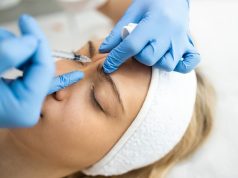10-year-old presented with erythematous, pruritic, papulovesicular rash after black henna tattoo
FRIDAY, May 13, 2016 (HealthDay News) — Black henna, used in temporary skin tattoos, can evoke type IV delayed hypersensitivity reactions, according to an article published online April 27 in BMJ Case Reports.
Caroline Rogers, from the Doncaster and Bassetlaw Hospitals NHS Trust in Worksop, U.K., and colleagues describe the case of a 10-year-old presenting with a three-week history of an erythematous, pruritic, papulovesicular rash on his right upper arm, which started four days after application of a temporary black henna tattoo.
The authors note that the boy was previously fit and healthy, with no prior history of atopy, eczema, or any allergic reactions. An erythematous papulovesicular, partially crusted skin lesion was noted on examination. Diffuse erythematous swelling was seen in the surrounding skin, which was hot and painful to touch. The patient was diagnosed with type IV delayed hypersensitivity to black henna with surrounding cellulitis. The patient was treated with three days of intravenous clindamycin followed by four days of oral flucloxacillin. For seven days, topical fuscidic acid plus hydrocortisone acetate cream and emollients were applied. After 48 hours, improvement was noted with rapid resolution of surrounding inflammation. After a week, residual hypopigmentation of the tattoo area was seen.
“Skin tattoos with black henna should be avoided, especially during foreign travel, as this can make the tracing of the vendor and any subsequent public health management challenging,” the authors write.
Copyright © 2016 HealthDay. All rights reserved.








